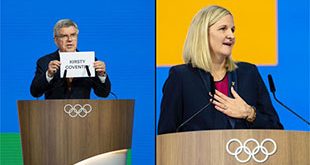When Wazobia FM, the first local Pidgin station, launched ten years ago, it was greeted with howls of derision by language puritans who predicted that the project would fail spectacularly.
How could a broadcaster discuss serious issues in street slang, the pedants asked.
The star host of the station’s breakfast show Mayowa Lambe said she “was struggling a bit at the beginning” to lose her English accent after years using the language.
“But the truth is, not everyone is educated in the country, and we have so many ethnic groups and so many languages. Everyone with a minimal level of education understands us, and can be informed,” she said.
“I love to listen to the news in Pidgin English — mainly because it makes it less tragic,” added Nigerian blogger Uduak Ubak.
“A good example is when the word ‘died’ is replaced with ‘delete’. When used in a sentence, we have something like ‘the man don delete’, meaning ‘the man has died’.”
And to commit a massacre is to “do-badness-to-people”.
The English word “kill is” reserved for a different context setting altogether.
In one of Lagos’ renowned mega clubs, a reveller might be heard to say “she dey kill me wit her mini-skirt o”, meaning they love the garment.
– ‘A language that belongs to nobody’ –
Wazobia FM, and many other stations like it, has meant a new level of recognition for Pidgin and its many speakers.
And for once it is the well-heeled, well-educated community scrambling to catch up.
“It’s a language that belongs to nobody at the same time as belonging to everybody,” said Bernard Caron, a linguist specialising in Nigeria at France’s CNRS research institute. “It’s also something that will unite the country, a way of reappropriating English while asserting its own identity.”
Labaran says she feels like she is delving into the history of the language since her studio began using the medium.
“It’s going to be a defining point for the language,” she said.
And for Nigeria’s relationship with its colonial past?
“I didn’t put it that way. But…” she smiled.
 The Independent Uganda: You get the Truth we Pay the Price
The Independent Uganda: You get the Truth we Pay the Price



